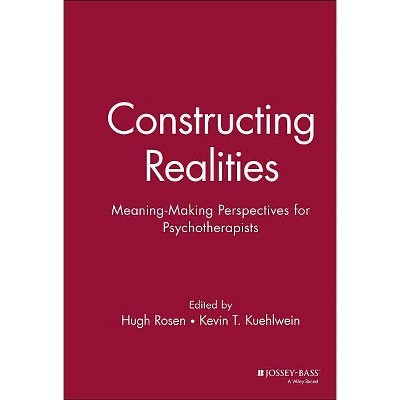Constructing Realities - (Jossey-Bass Social & Behavioral Science) by Hugh Rosen & Kevin T Kuehlwein (Hardcover)

Similar Products
Products of same category from the store
AllProduct info
<p/><br></br><p><b> Book Synopsis </b></p></br></br>An insightful, provocative collection that will enrich your work with new vitality, meaning, and direction. Offers timely perspectives on the theory and practice of psychotherapy as reflected in the themes of narrative, constructivism, social constructionism, postmodernism, epistemology, developmental constructivism, language, and social discourse.<p/><br></br><p><b> From the Back Cover </b></p></br></br><p><b>A landscape of new places to go in the therapeutic process</b></p> <p>"This book is thought-provoking and practice-informing testimony that the idea of 'meaning-making' is not only alive and well in psychotherapy, but a generative meeting ground for a richly diverse set of clinical orientations. Any therapist, student, or teacher of therapy will feel well rewarded by this stimulating and challenging collection."<br /> <b>--ROBERT KEGAN, </b> Harvard University and the Massachusetts School of Profesional Psychology, author of <i>The Evolving Self</i> and <i>In Over Our Heads</i></p> <p>"This is the best overview of current thinking in constructivist thought currently available. I recommend this book for the serious professional library."<br /> <b>--ALLEN IVEY, </b> distinguished university professor, University of Massachusetts, Amherst</p> <p>"In this volume, Rosen and Kuehlwein have collected a distinguished panel of scholar-practitioners who trailblaze in this still somewhat uncharted domain of meaning-making psychotherapies. Between them, they construct a landscape of new places to go in the conduct of the therapeutic process--places that all psychotherapists of whatever persuasion will find provocative and evocative in their own practices."<br /> <b>--JOHN SHOTTER, </b> professor of interpersonal relations, Department of Communication, University of New Hampshire</p> <p>"This book celebrates the many ways in which meanings are created (not discovered) and what these changes in the way we see the world signify for therapists and their clients. Richly rewarding and highly recommended."<br /> <b>--DONALD P. SPENCE, </b> professor of psychiatry, UMDNJ, New Jersey's University of the Health Sciences, Robert Wood Johnson Medical School</p><p/><br></br><p><b> Review Quotes </b></p></br></br><br>The book is serious, worthy, and its aim is laudable.<br /> <br /> This book is thought-provoking and practice-informing testimony that the idea of `meaning-making' is not only alive and well in psychotherapy, but a generative meeting ground for a richly diverse set of clinical orientations. Any therapist, student, or teacher of therapy will feel well rewarded by this stimulating and challenging collection. --Robert Kegan, Harvard University and the Massachusetts School of Professional Psychology and author of The Evolving Self and In Over Our Heads<br /> <br /> This is the best overview of current thinking in constructivist thought currently available. Social constructivism finally gets the attention it deserves, including women's issues and interesting work from an Eastern perspective. I recommAnd this book for the serious professional library. --Allen Ivey, distinguished university professor, University of Massachusetts, Amherst <br /> <br /> In this volume, Rosen and Kuehlwein have collected a distinguished panel of scholar-practitioners who trailblaze in this still somewhat uncharted domain of meaning-making psychotherapies. Between them, they construct a landscape of new places to go in the conduct of the therapeutic process--places that all psychotherapists of whatever persuasion will find provocative and evocative in their own practices. --John Shotter, professor of interpersonal relations, Department of Communication, University of New Hampshire<br /> <br /> This book celebrates the many ways in which meanings are created (not discovered) and what these changes in the way we see the world signify for therapists and their clients. The contributors to this volume bring new ways of understanding the roles of narrative and language, the many meanings of knowing and telling, and breathe new life into the once-discredited idols of reason. Richly rewarding and highly recommAnded. --Donald P. Spence, professor of psychiatry, UMDNJ, New Jersey's University of the Health Sciences, Robert Wood Johnson Medical School<br /> <br /> Many readers will find the solid base of philosophy refreshing in a time when conceptual clarity seems secondary to practical concerns. I highly recommAnd it to those clinicians seeking a foundation for their own personal and theraputic realities. --J. Phillip Stanberry, Ph.D. School of Family and Consumer Sciences, U of Southern Mississippi, Readings: A Journal of Reviews and Commentary in Mental Health<br><p/><br></br><p><b> About the Author </b></p></br></br><p><b>HUGH ROSEN</b> is professor and interim chairperson in the Department of Mental Health Sciences, School of Health Sciences and Humanities, at the Medical College of Pennsylvania and Hahnemann University. He is the author of <i>Piagetian Dimensions of Clinical Relevance</i> (1985) and the coeditor of <i>Constructivist Perspectives on Developmental Psychopathology and Atypical Development</i> (1991) with Daniel P. Keating.</p> <p><b>KEVIN T. KUEHLWEIN</b> is a staff psychologist and clinical associate at the Center for Cognitive Therapy at the University of Pennsylvania. He served as the first clinical coordinator of the Beck Institute for Cognitive Therapy and Research in suburban Philadelphia. His is, with Hugh Rosen, the coeditor of <i>Cognitive Therapies in Action</i> (1993) a Jossey-Bass publication.</p>
Price History
Price Archive shows prices from various stores, lets you see history and find the cheapest. There is no actual sale on the website. For all support, inquiry and suggestion messagescommunication@pricearchive.us




















